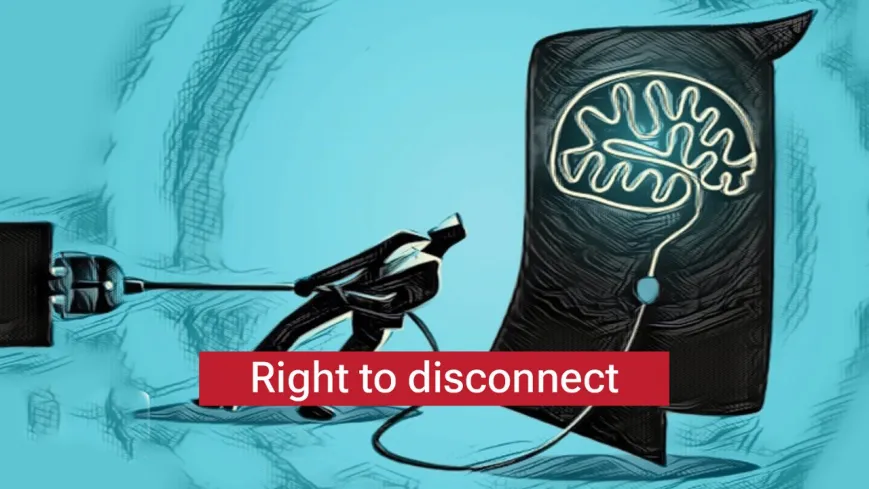Farheen Penwale
Principal Associate, Lectio Law Offices
A young employee collapsed at her desk a year back; early twenties, exhausted, her life reduced to unread e-mails and unending deadlines. Weeks ago, another image captured the nation’s attention: a woman in a darkened cinema hall, laptop open, finishing her presentation while a movie played on the big screen. She was not working late, she was working everywhere.
As a mother to a seven-year-old, I know exactly what that performance and its pressure feels like. Brushed aside in job interviews because “motherhood is a handicap no….”, I have drafted pleadings from hospital corridors, joined client calls during bedtime stories and turned guilt into a daily companion. Every “no” feels like an act of rebellion; every pause, an explanation waiting to be justified. Yes, I have rights; but do I really have them if I cannot afford to exercise them?
When a leading actress, a new mother who has given years to her craft and earned national and international acclaim, asked for eight-hour shifts, her request was brushed aside. She was told the film deserved commitment and much more. The next day, the King of Bollywood announced she would star in his film. She had the privilege to walk away; not everyone has.
In a just world, the time of a CEO and a delivery rider should be valued the same; but in our reality, the rich buy time while the poor sell it. The Right to Disconnect tries to restore that balance, however imperfectly. It says, quietly but firmly; your time, too, is yours.
As the Kerala Assembly prepares to debate the Right to Disconnect Bill, the original proposal introduced in Parliament in 2019 remains pending. Nearly five years on, the idea has found its first serious platform for discussion; perhaps a quiet reminder that even conversations on rest take their own time to arrive. The irony is telling. We are debating the idea of rest, not practising it. Somewhere between these extremes lies the question we keep avoiding. What about the right to connect; not to Wi-Fi, but to life?
I am writing this article on my way home from work: a laptop open in a moving cab, phone buzzing with notifications, deadlines waiting at the next red light. And I ask myself, “What do I really need; to connect or to disconnect?” I am in a position to critique the Right to Disconnect but am I also not the one to be blamed? I celebrate the freedom to question it, yet I am part of the same culture that glorifies being always available. I can choose to rest, at least in theory. I have that agency; however, millions do not. Their survival depends on saying yes, not on switching off. Perhaps that is exactly why we need this right; not for those who already have the privilege of choice, but for those who never did. Maybe we need this law to bring everyone a little closer to the same line of dignity, where rest is not a luxury, but a right?
A Society that fears saying No
In our world, saying “no” has become a professional risk. Refuse to take a late call and someone else will. Decline weekend work and you will be labelled “uncooperative”. Jo dikhta hai, vo bikta hai. Loyalty today is measured not by integrity but by visibility. We have built a culture that rewards exhaustion and mistrusts rest.
Advertisements glorify the superwoman who can do it all: take meetings on maternity leave, work through her periods, cook lavish dinners after returning from work and close deals from the kitchen counter. We have romanticised sleeplessness as success and multi-tasking as strength. Even the idea of “balance” has been hijacked by brands promising that you can “have it all”, as long as you never stop performing.
Perhaps, I am not blameless either. I, too, love the validation, the sense of being needed, the praise that comes with perseverance. It is a double-edged sword; we crave rest, yet fear irrelevance.
The thin line between Ambition and Exploitation
The Right to Disconnect seeks to confer on employees the right to refuse calls, e-mails and messages beyond agreed work hours, without fear of reprisal. It also proposes overtime pay for after-hour work and mandates welfare committees to negotiate these terms with employers.
Critics have called it idealistic, unworkable and premature for a country where most workers are still fighting for minimum wages and safe commutes. They are not wrong. India’s workforce is divided: between those who work in glass towers and those who work in heat and dust. Between those who sign contracts and those who sign attendance sheets with fingerprints. Between those who log in and those who lift.
Yet, the exhaustion is universal. The factory worker who takes night shifts and the associate who drafts through dawn share the same fatigue; only the screens differ. Lawyers, doctors, delivery executives, domestic workers, all bound by an invisible contract that says: if you rest, you fall behind.
Between Law and Life
Indian courts have long recognised that the right to life under Article 21 is not just the right to exist but to live with dignity. In People’s Union for Democratic Rights v. Union of India (1982), the Supreme Court held that humane working conditions form part of that dignity. In Bandhua Mukti Morcha v. Union of India (1984), it expanded the idea to include the right to health and freedom from exploitation. Later, in Consumer Education and Research Centre v. Union of India (1995), the Court reaffirmed that “the right to health and leisure is an integral facet of the right to life”. The Court observed that the right to human dignity, development of personality, social protection, right to rest and leisure are fundamental human rights to a workman assured by the Charter of Human Rights, in the Preamble and Articles 38 and 39 of the Constitution.
“25. Therefore, we hold that right to health, medical aid to protect health and vigour of a worker while in service or post-retirement is a fundamental right under Article 21, read with articles 39(e), 41, 43, 48-A and all related articles and fundamental human rights to make the life of the workman meaningful and purposeful with dignity of person.”
If overwork erodes health, if exhaustion blurs the line between human and machine, then the absence of rest is not just an occupational issue, it is a constitutional one. The Right to Disconnect is, therefore, not a novelty; it is a continuation of what our jurisprudence has quietly affirmed for decades.
However, legislation alone cannot guarantee dignity. Laws already exist to ensure fair wages, reasonable hours and weekly holidays. Yet enforcement is uneven and awareness low. For many, asserting a right still feels like disobedience. The issue, then, is not merely legal; it is cultural.
The Mindset Problem
Fatigue has become a badge of honour. Overwork, a mark of loyalty. We have normalised exhaustion so deeply that even the exhausted wear it as proof of worth. The person who stays longest in office is celebrated, not questioned. This makes the problem cultural before it is legal.
Passing a law may create a framework but changing a mindset requires unlearning: of guilt, competition and misplaced pride in self-neglect. The one who asserts a boundary risks being replaced by another who does not. Until that changes, no statute will be enough.
The Illusion of Choice
Supporters of the Right argue that developed nations have already moved to shorter work weeks and higher productivity. However, we forget that in those countries, systems support rest; public transport works, wages sustain families and employers recognise that burnout is bad economics. Here, we wear fatigue like a badge of honour.
The Right may be aspirational but aspiration is not a flaw. Every reform begins as idealism before it becomes reality. Somewhere, we have to begin; even if imperfectly, because the alternative is a country that keeps glorifying overwork until more desks fall silent.
The Unorganised Majority
Over 80% of India’s workforce is unorganised. They do not have digital devices, yet they live digital consequences. A factory hand or a sanitation worker may not receive late-night e-mails but their shifts stretch endlessly without rest or pay. They too deserve the right to disconnect; not from the internet but from relentless labour that leaves no space for life.
And what of the so-called professionals: lawyers and doctors? Both belong to vocations built on service, where duty is eternal and rest feels like betrayal. In my twelve years at the Bar, I have seen young lawyers sleep in chambers and seniors answer calls at midnight because “the client is waiting”. Doctors, too, live between emergencies and expectations. If professions meant to protect life treat their own time as dispensable, what message does that send to society?
A Question of Value
The Right to Disconnect is not just a labour reform; it is a moral mirror. It asks what we value more; efficiency or existence? The Bill speaks of counselling, digital detox centres and welfare charters. Critics may scoff but buried in those clauses is an unspoken recognition that time, like money, is unequally distributed.
In a third-world economy, we count output but not hours lost to traffic, power cuts or unpaid “availability”. No company compensates the mother who misses dinner or the father who misses childhood. Yet, these are the invisible taxes of ambition.
The Irony of (Dis)Connection
Here lies the irony: unless we learn to disconnect, we will never truly connect.
The Right to Disconnect is not a protest against productivity but a plea for perspective. It is not an escape from work but an attempt to reclaim life from its margins. In disconnecting from the machine, we may just rediscover the human.
The Right We forgot to claim
We live in an age where being “always on” is sold as opportunity. Where the worth of a worker is measured by how quickly they reply, not by what they contribute. Where silence is misread as incompetence.
The right to disconnect is, at its heart, the right to say “enough”, not out of defiance but out of dignity. It is not anti-work. It is pro-life. It recognises that productivity without pause is depletion, not progress.
So perhaps, instead of debating whether this Bill is premature, we should be asking why did it take us so long to recognise that human time, rich or poor, man or woman, is not infinite?
When “no” becomes a threat, “rest” becomes rebellion and when rest becomes rebellion, something fundamental in our idea of humanity has already broken.
Perhaps a right to disconnect is the only way left to truly connect?



